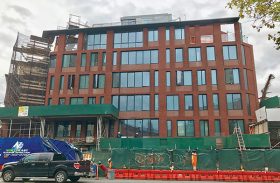By Steve Wilson

THE THREAT OF ONLINE RETAILERS: Many West Village residents order products from online retailers such as Amazon, thereby neglecting traditional brick-and-mortar businesses. Photo by Stephanie Phelan.
In the September issue of Westview, I discussed the impact of escalating commercial rents and the resulting closures of restaurants and retail stores within the West Village. In Part Two, I explore the impact of online retailers on that commercial landscape.
The impact of online merchants like Amazon and FreshDirect on West Village life is significant. Michael Suggs, a 15-year daytime veteran doorman at The Printing House, says his job is now dominated by organizing and delivering an onslaught of 50 to 100 packages from Amazon each day. On holidays, Suggs says the numbers rise exponentially—10 times the normal Amazon traffic. Even when there are locally available products, the West Village is increasingly turning to Amazon or FreshDirect, while local merchants (like the now-closed Mrs. Green’s) have trouble surviving. With Amazon’s recent purchase of Whole Foods, there’s more disruption to come.
Zoomies pet supply store successfully fights against online sales by building a unique brand of goods and a dog community to attract neighborhood dog owners. Co-owners Susan Bartholomew and Angelique Rufty-Graux point to a positive landlord-tenant relationship, keeping overhead low, and providing top customer service as the best ways to compete. Zoomies is also very involved with the neighborhood, assisting with dog rescue and local dog runs.
Perhaps the most surprising optimist is the now-closed Hub Bicycle’s George Bliss. After Citi Bike’s government-supported entry into the bike rental business wiped out Bliss’ rental enterprise, the developer of nearby 150 Charles, Steve Witkoff, helped keep HUB alive for months. Bliss, a bike activist who once took on Mayor Bloomberg to defend pedicabs, believes landlords may finally understand that they need to help vital local retailers to keep their places rented.
Bliss says Witkoff told him that businesses like HUB Bicycles (and perhaps owners like Bliss) are what make the West Village unique. Steve Witkoff may be supportive, but clearly, other landlords are willing to raise rents to extreme heights, which are unsustainable for most local small businesses. Bliss points out that landlords who think that way will face empty storefronts that may never recover.
Neighborhoods may also be getting less dense and much wealthier. Former West Village favorite Café Minerva saw its traffic shrink dramatically when buildings across the street consolidated to one private house. This phenomenon repeats itself throughout the Village, perhaps the most extreme example being the Village Nursing Home on Abingdon Square, which was replaced by just four super-luxury apartments. Density may remerge when the next barrage of new luxury buildings come online over the next two years, but the demographic of residents continues to go significantly upscale.
The newly opened Merriweather Coffee + Kitchen at 428 Hudson Street (between Morton and Leroy Streets) paid attention to at least the younger side of the changing neighborhood. It chose to focus on healthier foods, like an avocado smash, and specialty coffee to appeal to creative millennials who work nearby. Australian founder Peter Godhard believes that providing extremely friendly customer service in a space where people want a break from work makes a difference. So far, Merriweather is packed during the day with the customers Godhard seeks.
The combination of online disruption and luxury rents will continue to impact local businesses that are indispensible to West Village life—forcing change at the local diner, restaurant, bike shop, pet store, and cafe. Complete engagement with online vendors guarantees that local businesses will have difficulty surviving. Changing food choices by newer, wealthier neighbors moving in will impact those like Ramon Carbirone who has served this neighborhood faithfully at the Hudson Diner for 15 years. Ramon says it will be difficult to sustain a decent living without new business returning. Increased opportunities for customers to shop online and high rents may deliver a deathblow to the small businesses that make the West Village unique.
If residents want to keep these businesses alive, they must, whenever possible, purchase goods and services from their neighbors. And to keep healthy tenants, local landlords will have to be more constructive in their rent demands of both new and existing businesses.



